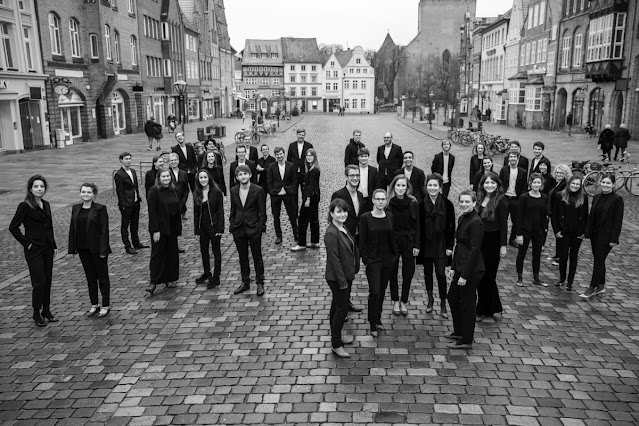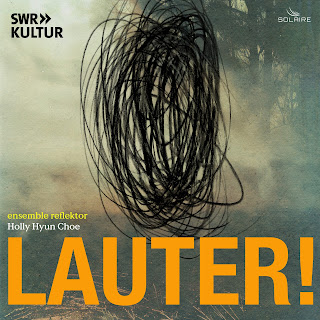Lauter! Ethel Smyth, inti figgis-vizueta;Ying Wang; ensemble reflektor, Holly Hyun Choe; Solaire Records
Reviewed 14 January 2025
Ethel Smyth’s earliest orchestral work alongside contemporary pieces by inti figgis-vizueta and Ying Wang in an intriguing programme that brings a sense of contrast, of creating worlds.
Lauter! from ensemble reflektor on Solaire records combines two contemporary female composers with an early work by a female composer in the historical canon. Conducted by Holly Hyun Choe, the ensemble performs inti figgis-vizueta‘s devour, Ying Wang’s Freiheit is der Atem der Kunst and Ethel Smyth’s Serenade in D major. The two contemporary works were commissioned by PODIUM Esslingen and premiered at PODIUM Festival 2023.
Based in North Germany but with strong links to PODIUM Esslingen near Stuttgart, ensemble reflektor is a lively chamber orchestra and Lauter! is their fourth disc, each one encompassing a mix of the old and the new, the classic and the cutting edge.
The Serenade in D major was Ethel Smyth’s first major orchestra work, written in late 1889 and premiered at a Crystal Palace concert in 1890 with the composer conducting. Apart from an overture dating from the same period, Smyth wrote little further orchestral music that was not connected to her operas until the late Concerto for violin and horn in 1926. After 1890 her attention would turn towards her Mass in D and her first opera, Fantasio.
Smyth’s decision to study music in Leipzig arose because of the reputation of the Leipzig Conservatoire which had been founded by Mendelssohn. Though Smyth found the teaching unimpressive and left after a year, studying privately instead with Heinrich von Herzogenberg, a pedagogue who was close to Brahms. Smyth’s circle included both Clara Schumann and her family, and Fanny Mendelssohn-Hensel’s family.
Smyth’s attitude to Brahms is interesting, she was firmly on the Brahms axis in the Brahms versus Liszt/Wagner divide, yet it is clear from her major operas that she learned from Wagner’s operatic methods and she was quite firm that she disliked Brahms the man, finding his attitude to women objectionable. In her autobiography, The Impression that Remained she said, “As the great Brahms recently proclaimed: ‘A clever woman is a thing of naught!’ So let us diligently cultivate stupidity, That being the only quality demanded Of a female Brahms-admirer!”
Her four movement Serenade in D major is often called Brahmsian, and we can appreciate the sentiment though Smyth bringing in a certain open-air feeling too, and there is a lightness to the textures on this recording that at times recalls Mendelssohn. The long first movement, Allegro non troppo lasts over 13 minutes and feels like a Brahms serenade cut through with Mendelssohn, lyrical yet unfettered and rather free form. There is something of the operatic prelude about the piece, we keep expecting the drama to happen. What comes next is the light and perky Scherzo, full of character and suggestive of an operatic overture. The light and flowing third movement, Allegretto grazioso is engaging, full of colour and movement, and Mendelssohn never seems far away. The finale is lively but with a light touch, though at times the music is rather considered.
The whole piece feels slightly too long, and you sense that Smyth’s interest was not in purely orchestral music and her more dramatic bent bubbles under the surface. What is lovely about this performance is the light, chamber feel that Choe and her players bring. There is also the completely lack of doing the piece out of a sense of worthiness, Smyth isn’t there because she’s a neglected English composer. You feel the players enjoying her unfettered, slightly freeform take on Mendelssohnian Brahms.
They follow this with New York-based composer init figgis-vizueta’s devour, a work that she describes thus, ‘I was thinking about looking at the creation of a small universe and observing its history in fast motion.’
We begin with music that is barely there, simply touches of notes in mainly the wind in a manner that evokes the very beginning of the storm in Beethoven’s Pastoral Symphony. The textures develop, figgis-vizueta’s universe gets more complex, yet through there is plenty of colour and flow, there is also a feeling of witholding, the music does not louden. Harmonic disturbances lead to an intensification and a slow build towards anger and dissonance. The interest throughout is textural rather than motivic, and after a climax the universe withdraws into itself.
Ying Wang was born in China, studied in Cologne and lives in Berlin. Freiheit is der Atem der Kunst (Freedom is the breath of art) is based around the idea of AI, with Wang using mosaics of small scale blocks to create larger designs. We being with just a single note and then two, creating a dissonance that is profound because of its isolation. The music extends, the dissonance developing. Colour and movement are allied to violence and dissonance, but always a sense of constant movement, a gradual build up.
Whilst the Smyth was recorded in studio conditions (at SWR studios in Stuttgart), the two contemporary pieces were recorded live in Berlin, which makes the performances all the more impressive. All three are entirely engaging and make you think about the music rather than worrying about the performance.
 |
| ensemble reflektor |
The liner notes provide little clue as to why this disc is called Lauter! (Louder) which makes the programme all the more intriguing. Overall it is not a particularly loud programme, and I don’t know quite whether the works speak to each other. But there is certainly a sense of contrast, of creating worlds, that with her Serenade Smyth was just as much creating her own personal world as figgis-vizueta and Wang are.
Ethel Smyth (1858-1944) – Serenade in D major
inti figgis-vizueta (born 1993) – devour
Ying Wang (born 1976) – Freiheit is der Atem der Kunst
ensemble reflektor
Holly Hyun Choe (conductor)
Recorded 25-27 March 2024, SWR Funkstudio, Stuttgart; 4 & 5 November 2023. Theater am Delphi, Berlin
SOLAIR SOL1017 1CD [58.05]
The blog is free, but I’d be delighted if you were to show your appreciation by buying me a coffee.
Elsewhere on this blog
- The complete Walton songs: there aren’t that many but Siân Dicker, Kyrstal Tunnicliffe, Saki Kato certainly make us understand why they are all worthy of attention – record review
- The idea of Greece: Robin Tritschler and Jonathan Ware in a wide-ranging recital from Schubert, Loewe & Wolf to Shostakovich, Dvorak, Berkeley & Ravel – concert review
- Uprising! Director Sinéad O’Neill on Glyndebourne’s new community opera written by Jonathan Dove and April De Angelis – feature
- Drawing us in: baritone James Atkinson makes his Wigmore Hall debut with pianist Iain Burnside in a programme moving from Robert to Clara Schumann to Brahms’ late tombeau for Clara – concert review
- New Year in Berlin: taking new Torsten Rasch, Beethoven’s Choral Symphony, Mendelssohn’s Paulus & artists of Circus Roncalli – concert review
- 2024 – A year in record reviews: white-hot prophets, sensitive souls, a German in Venice, Holst’s organ and the 20th century brass band – article
- 2024 – A year in concert reviews: astonishing youth, late-romantic rarities, riveting symphonic theatre – article
- 2024 – A year in opera reviews: strong individual performances, reinventing classics and historically informed Wagner – article
- Modern aspects of the Christmas story: Gabriel Jackson’s The Christmas Story and Edward Nesbit’s Nativity – record review
- The Dunedin Consort at Wigmore Hall: Caroline Shaw premiered alongside rare Stradella and Christmas Corelli – concert review
- Vivid engagement, vigorous articulation & imaginative programming: The English Concert at Wigmore Hall – concert review
- Home









